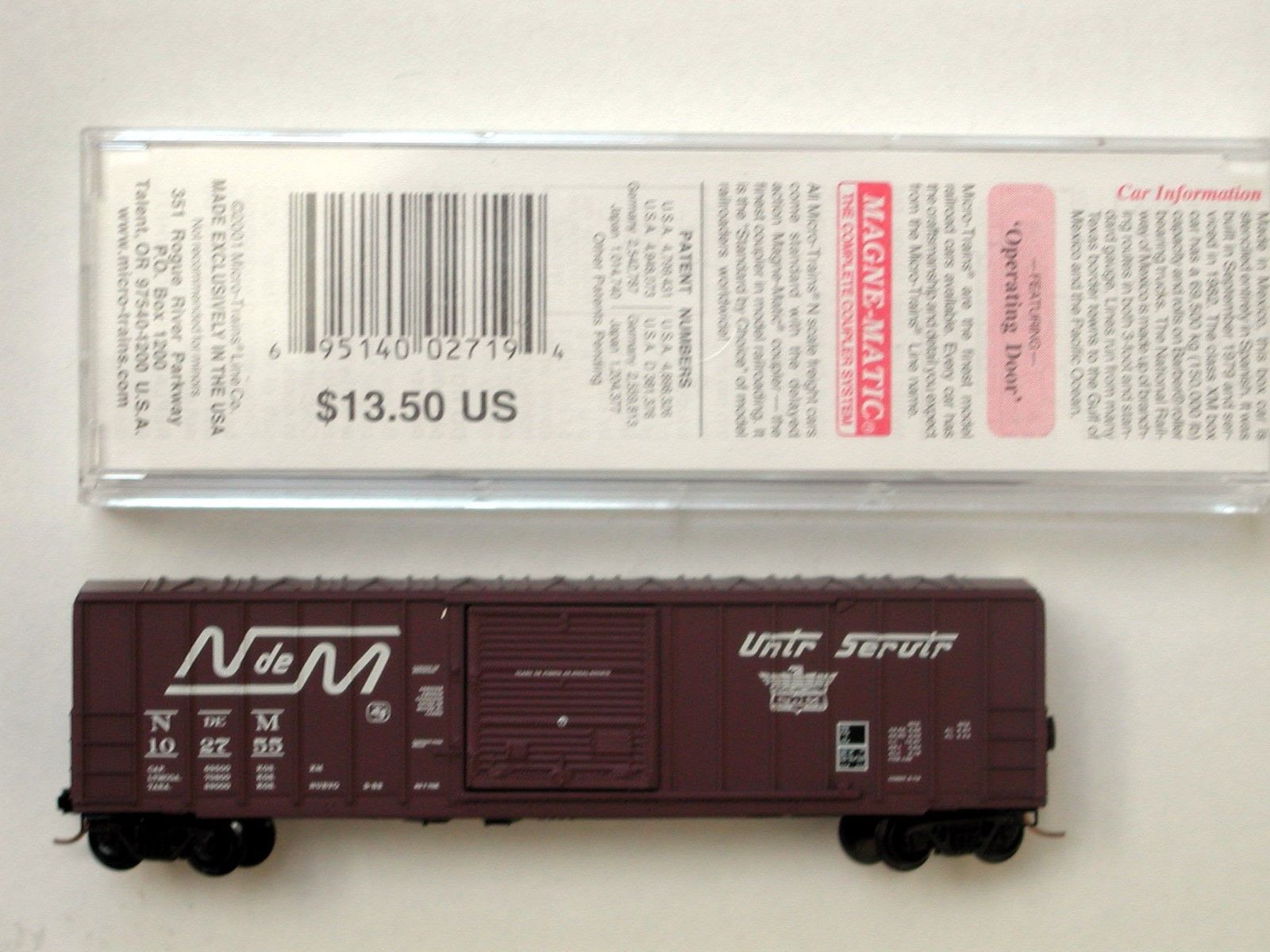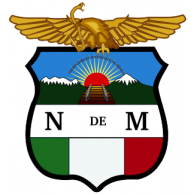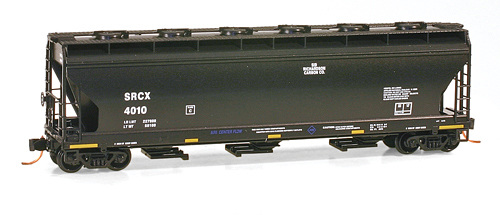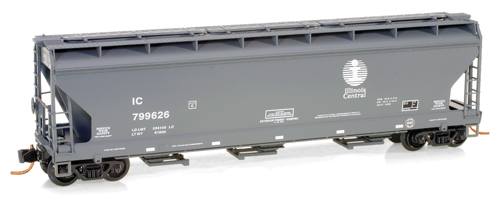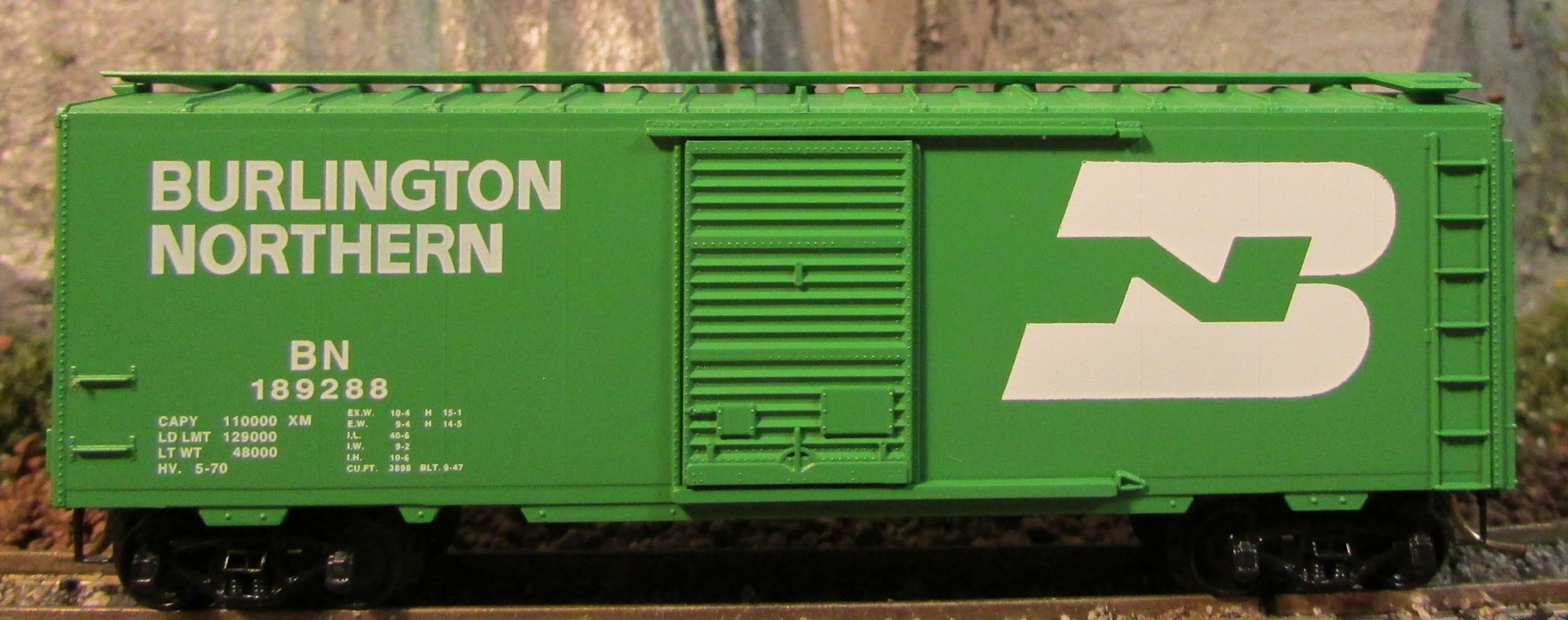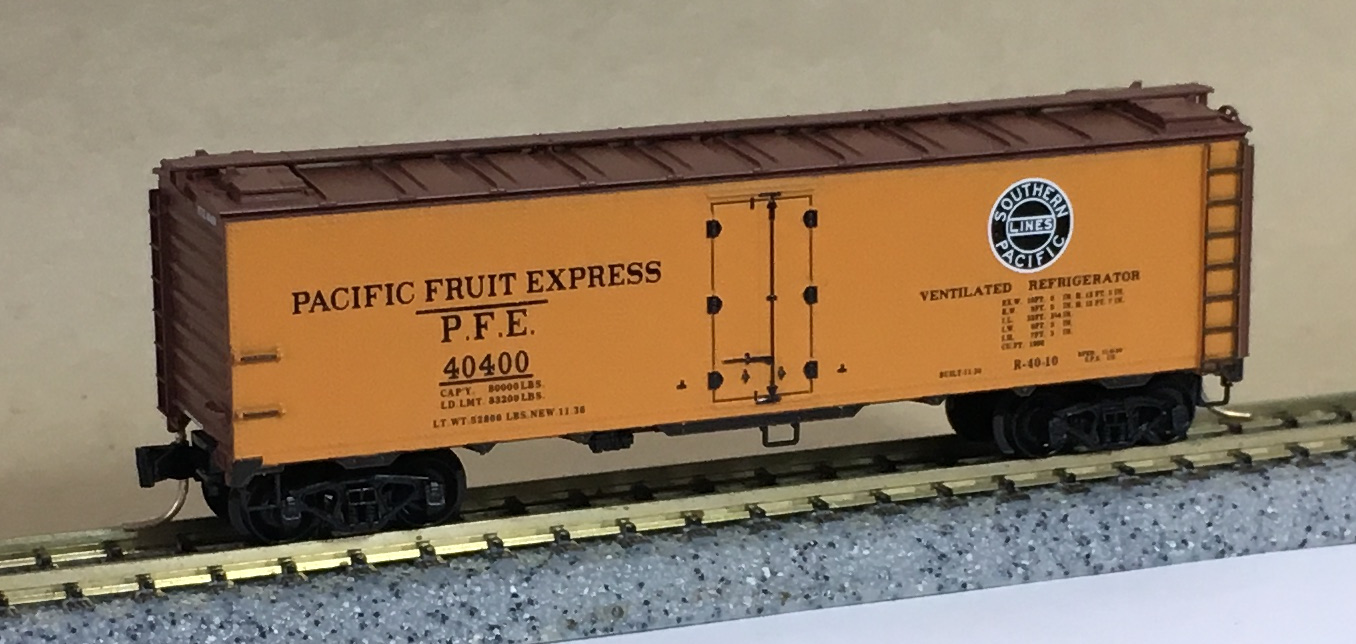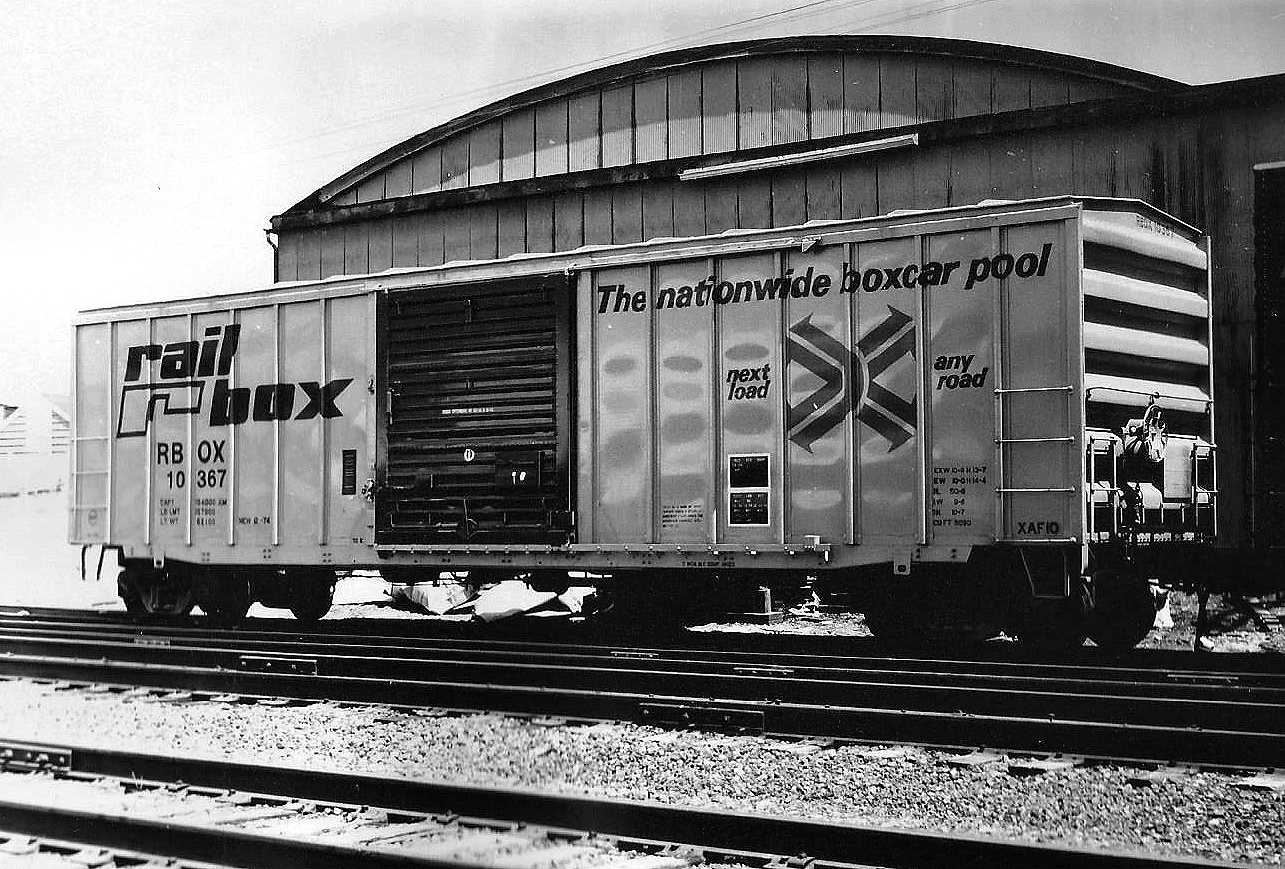Model Information: This model was first produced by Kadee in February of 1981. It is a model of a 50 Foot Steel Rib-Side Single Sliding Door Boxcar. Specifically, this Micro-Trains body style models the FMC 50' 5077 Single Sliding Door prototype. It is also used by Micro-Trains to model Pullman Standard 50' boxcars. Hence on some releases, this car is labeled as a Pullman Standard and in other cases it is labeled as an FMC boxcar, and it also is frequently labeled as a '50' Rib Side Box Car[sic]' with no mention of prototype whatsoever. It appears to be closest to the FMC 5077 boxcar prototype (from the 1970s) in any event. These models can appear with any one of multiple different sliding door types. The doors for this model are operating ones (cool!).
Prototype History: In the 1970's with the growth of the Per Diem business model, FMC produced a series of 50 foot box cars in different configurations. The single-sliding-door configuration is one of the best known and used widely by many different railroads. These cars were produced using the Gunderson metal works which FMC had acquired in 1965. In late 1975, FMC began producing a 5,077-cubic-foot Plate B box car for IPD and Railbox service. FMC's 5077s have seven panels to either side of the 10-foot door, an X-panel roof, and non-terminating ends that are slightly different from those used on FMC's earlier cars. Note how the sidesill is notched all the way back to the bolsters, a key feature of FMC's mature design.
The main difference between the 5077 cu. ft cars built by FMC vs the 5277-5347 cu. ft cars built by the same manufacturers is the overall height of the car, the smaller 5077 cars were Plate B while the larger 5277-5347 cars were Plate C. Over 4,300 cars were produced from 1975-1979 by FMC's Portland, Oregon plant. The cars were delivered in numerous colorful shortline paint schemes, as well as the nationwide car pool fleet of Railbox. Many secondhand cars were later seen in Class 1 railroads and large leasing company fleets under additional shortline reporting marks.
The main difference between the 5077 cu. ft cars built by FMC vs the 5277-5347 cu. ft cars built by the same manufacturers is the overall height of the car, the smaller 5077 cars were Plate B while the larger 5277-5347 cars were Plate C. Over 4,300 cars were produced from 1975-1979 by FMC's Portland, Oregon plant. The cars were delivered in numerous colorful shortline paint schemes, as well as the nationwide car pool fleet of Railbox. Many secondhand cars were later seen in Class 1 railroads and large leasing company fleets under additional shortline reporting marks.
Road Name History: Ferrocarriles Nacionales de México, (better known as N de M) was Mexico's state owned railroad company from 1938 to 1998, and prior to 1938 (dating from the regime of Porfirio Diaz) a major railroad controlled by the government that linked Mexico City to the major cities of Nuevo Laredo and Ciudad Juarez on the U.S. border. The first trains to Nuevo Laredo from Mexico City began operating in 1903.
N de M absorbed the Mexican Central Railroad (Ferrocarril Central Mexicano, first section from Mexico City to Leon, Guanajuato, opened in 1882) in 1909, thus acquiring a second border gateway at Ciudad Juarez (adjacent to El Paso, Texas). The N de M was nationalized by President Lazaro Cardenas del Rio in 1938, and privatized 60 years later by President Ernesto Zedillo. N de M operated most railway trackage through the central and northeastern regions of the republic.
In 1995, the Mexican government announced that the FNM would be privatized and divided into four main systems. As part of the restructuring for privatization, FNM suspended passenger rail service in 1997, and the new arrangements applied from 1998. The companies were Kansas City Southern de Mexico, Ferromex, Ferrosur, and (owned jointly by the three companies) Ferrocarril y Terminal del Valle de Mexico or Ferrovalle which operates railroads and terminals in and around Mexico City.
As of 2006, the remaining parts of NdeM are in the process of liquidation.
N de M absorbed the Mexican Central Railroad (Ferrocarril Central Mexicano, first section from Mexico City to Leon, Guanajuato, opened in 1882) in 1909, thus acquiring a second border gateway at Ciudad Juarez (adjacent to El Paso, Texas). The N de M was nationalized by President Lazaro Cardenas del Rio in 1938, and privatized 60 years later by President Ernesto Zedillo. N de M operated most railway trackage through the central and northeastern regions of the republic.
In 1995, the Mexican government announced that the FNM would be privatized and divided into four main systems. As part of the restructuring for privatization, FNM suspended passenger rail service in 1997, and the new arrangements applied from 1998. The companies were Kansas City Southern de Mexico, Ferromex, Ferrosur, and (owned jointly by the three companies) Ferrocarril y Terminal del Valle de Mexico or Ferrovalle which operates railroads and terminals in and around Mexico City.
As of 2006, the remaining parts of NdeM are in the process of liquidation.
Brand/Importer Information: Micro-Trains is the brand name used by both Kadee Quality Products and Micro-Trains Line. For a history of the relationship between the brand and the two companies, please consult our Micro-Trains Collector's Guide.
Manufacturer Information:  Micro-Trains Line split off from Kadee Quality Products in 1990. Kadee Quality Products originally got involved in N-Scale by producing a scaled-down version of their successful HO Magne-Matic knuckle coupler system. This coupler was superior to the ubiquitous 'Rapido' style coupler due to two primary factors: superior realistic appearance and the ability to automatically uncouple when stopped over a magnet embedded in a section of track. The success of these couplers in N-Scale quickly translated to the production of trucks, wheels and in 1972 a release of ready-to-run box cars.
Micro-Trains Line split off from Kadee Quality Products in 1990. Kadee Quality Products originally got involved in N-Scale by producing a scaled-down version of their successful HO Magne-Matic knuckle coupler system. This coupler was superior to the ubiquitous 'Rapido' style coupler due to two primary factors: superior realistic appearance and the ability to automatically uncouple when stopped over a magnet embedded in a section of track. The success of these couplers in N-Scale quickly translated to the production of trucks, wheels and in 1972 a release of ready-to-run box cars.
Micro-Trains Line Co. split off from Kadee in 1990 to form a completely independent company. For this reason, products from this company can appear with labels from both enterprises. Due to the nature of production idiosyncrasies and various random factors, the rolling stock from Micro-Trains can have all sorts of interesting variations in both their packaging as well as the products themselves. When acquiring an MTL product it is very important to understand these important production variations that can greatly enhance (or decrease) the value of your purchase.
Please consult our Micro-Trains Collector's Guide

Micro-Trains Line Co. split off from Kadee in 1990 to form a completely independent company. For this reason, products from this company can appear with labels from both enterprises. Due to the nature of production idiosyncrasies and various random factors, the rolling stock from Micro-Trains can have all sorts of interesting variations in both their packaging as well as the products themselves. When acquiring an MTL product it is very important to understand these important production variations that can greatly enhance (or decrease) the value of your purchase.
Please consult our Micro-Trains Collector's Guide
Item created by: Lethe on 2015-05-31 17:46:30. Last edited by foxs683 on 2023-12-17 21:27:54
If you see errors or missing data in this entry, please feel free to log in and edit it. Anyone with a Gmail account can log in instantly.
If you see errors or missing data in this entry, please feel free to log in and edit it. Anyone with a Gmail account can log in instantly.


